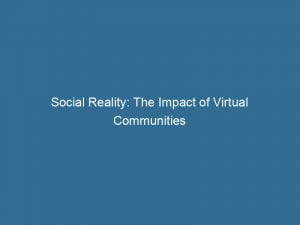- Social Reality
- Introduction To Social Reality
- Exploring The Nature Of Social Reality
- Understanding Social Reality Through Speech Acts Theory
- Debating The Existence Of Social Reality
- The Social Construction Of Reality
- Creation And Institutionalization Of Social Constructs
- Examples Of Social Constructs
- The Impact Of Social Constructs On Social Phenomena
- The Dynamic Nature Of Social Constructs
- Promoting Inclusivity Through The Recognition Of Socially Constructed Reality
Imagine a world where everything you know, everything you believe to be true, is nothing more than a collective creation. This is the realm of socialreality, where the boundaries of our understanding are shaped not just by biology or individual cognition, but by the intricate dance of social interaction.
It is a domain governed by accepted norms, unwritten laws, and shared representations. Within its intricacies, philosophers and social scientists delve deep, seeking to unravel the tapestry of our social existence.
Join us on a journey into the captivating realm of social reality, where the foundations of our society are laid bare.
| Item | Details |
|---|---|
| Topic | Social Reality: The Impact of Virtual Communities |
| Category | Ad Networks |
| Key takeaway | Imagine a world where everything you know, everything you believe to be true, is nothing more than a collective creation. |
| Last updated | December 27, 2025 |
reality">Social Reality
Social reality refers to the shared understanding of the world that is created through social interaction. It encompasses the accepted social norms, laws, and representations that guide our behavior and shape our experiences.
Social reality is not the same as biological reality or individual cognitive reality; it is a distinct realm shaped by human interaction. Philosophers such as Alfred Schütz, Émile Durkheim, and Herbert Spencer have delved into the nature of social reality, while John Searle has used speech acts theory to explain its facets.
There is ongoing debate regarding whether social reality exists independently of people’s involvement or whether it is solely constructed through human interaction. Scholars like Peter L.
Berger and R.D. Laing argue for the social construction of reality, emphasizing that social constructs are created, institutionalized, and can change over time.
Examples of social constructs include countries, money, and virginity. Recognizing that reality is socially constructed can foster inclusivity and a deeper understanding of the complexities of the human experience.
Key Points:
- Social reality is a shared understanding of the world created through social interaction.
- It is distinct from biological reality or individual cognitive reality.
- Philosophers and scholars have studied social reality and debated its existence independently of human involvement.
- Some argue for the social construction of reality, where social constructs are created, institutionalized, and can change over time.
- Examples of social constructs include countries, money, and virginity.
- Recognizing social constructs can foster inclusivity and a deeper understanding of human experience.
Sources
https://en.wikipedia.org/wiki/Social_reality
https://www.verywellmind.com/definition-of-social-construct-1448922
https://open.lib.umn.edu/sociology/chapter/1-2-understanding-society/
https://psychologydictionary.org/social-reality/
Check this out:
💡 Pro Tips:
1. Recognize the power of language: Language plays a crucial role in shaping social reality. The words we use and the meanings we assign to them can influence how we perceive and understand social phenomena. It’s important to critically examine the language we use and be aware of its potential to create or reinforce certain social constructs.
2. Context matters: Social reality is highly influenced by the context in which it is constructed. Different social groups or cultures may have different social norms, values, and beliefs. Understanding the contextual factors that shape social reality can help us better navigate and understand diverse social environments.
3. Question dominant narratives: It is important to critically question and challenge dominant narratives and social constructs that may perpetuate inequality or exclusion. By questioning and challenging these narratives, we can foster a more inclusive and equitable social reality.
4. Understand the power dynamics: Social reality is not neutral; power dynamics play a significant role in its construction. Recognizing and understanding power structures and inequalities can enable us to critically analyze the social constructs that perpetuate these power imbalances and work towards creating a more just and equitable social reality.
5. Embrace multiple perspectives: Social reality is complex and multifaceted. Embracing multiple perspectives allows us to gain a more comprehensive understanding of social phenomena and challenge our own biases and assumptions. Engaging in dialogue and actively seeking out diverse viewpoints can help us build a more inclusive and nuanced social reality.
Introduction To Social Reality
Social reality is a concept that distinguishes itself from both biological reality and individual cognitive reality. While biological reality refers to the physical characteristics and processes that make up the natural world, and individual cognitive reality pertains to one’s personal perceptions and experiences, social reality is shaped through social interaction and encompasses widely accepted social tenets and relatively stable laws and social representations.
Exploring The Nature Of Social Reality
Numerous philosophers and social theorists have delved into the nature of social reality, shedding light on its intricacies and complexities. Noteworthy figures such as Alfred Schütz, Émile Durkheim, Herbert Spencer, and John Searle have contributed significantly to our understanding of this phenomenon.
Schütz emphasized the subjective nature of social reality, asserting that individuals interpret their experiences through shared cultural meanings. Durkheim, on the other hand, focused on the collective consciousness and the role it plays in shaping social reality.
Spencer explored the evolutionary aspects of social reality while Searle introduced the speech acts theory, which explores how language and communication shape social reality.
Understanding Social Reality Through Speech Acts Theory
John Searle’s speech acts theory provides valuable insights into the mechanisms that underpin social reality. According to Searle, language serves as a powerful tool that enables individuals to perform acts that transform a situation or impose obligations.
By engaging in specific speech acts, individuals shape their social reality and influence the behavior and actions of others. Searle’s framework highlights how language and communication play a crucial role in constructing and maintaining social realities.
Debating The Existence Of Social Reality
Debates exist regarding the existence of social reality and whether it is an independent entity or solely the product of human interaction. Some argue that social reality exists independently, with its own set of laws and principles, regardless of human involvement.
Others propose that social reality is purely a human construction, emerging solely through our interactions and agreements. This ongoing debate reflects the complexity of the concept and the diverse perspectives in the field of social theory.
The Social Construction Of Reality
Peter L. Berger and R.D.
Laing have extensively examined the social construction of reality. They argue that reality itself is not an objective, fixed entity, but rather a subjective and dynamic construct that is shaped by social interactions and agreements.
Social constructs, such as beliefs, norms, and values, are created and institutionalized through human interaction. These constructs provide a framework through which individuals interpret and understand the world around them, giving rise to the social reality they experience.
Creation And Institutionalization Of Social Constructs
Social constructs are not abstract concepts but tangible entities that are created and institutionalized through human interaction. Individuals collectively agree upon the existence and significance of these constructs, which then become embedded in society’s structures, institutions, and practices.
The ongoing process of creation and institutionalization of social constructs gives rise to shared meanings and beliefs that shape social reality. This process is a key aspect of social life and the continuous reproduction of social order.
Examples Of Social Constructs
Social constructs encompass a wide range of concepts that have been created and institutionalized through human interaction. These constructs vary across cultures and societies, reflecting the intricate and diverse nature of social reality.
Some examples include:
These examples illustrate how social constructs influence various aspects of human life and provide frameworks through which individuals interact with one another and the world around them.
The Impact Of Social Constructs On Social Phenomena
Social constructs play a crucial role in shaping social phenomena. They influence the ways in which individuals perceive, interpret, and interact with the world, as well as how societal norms, values, and institutions are established and upheld.
Psychologists and social scientists extensively study social constructs to gain insights into how they shape individuals’ behaviors, attitudes, and identities. By understanding the impact of social constructs, researchers can better comprehend various social phenomena and develop strategies to address issues such as discrimination, inequality, and social exclusion.
The Dynamic Nature Of Social Constructs
It is important to recognize that social constructs are not fixed or immutable entities. They are dynamic and subject to change over time.
As societies evolve, cultural norms shift, and new ideas emerge, social constructs adapt to reflect these transformations. The process of deconstructing and reconstructing social reality is ongoing and influenced by social, political, and cultural developments.
Acknowledging the dynamic nature of social constructs allows for a more nuanced understanding of social reality and encourages individuals to challenge and reshape existing constructs that may perpetuate inequality and exclusion.
Promoting Inclusivity Through The Recognition Of Socially Constructed Reality
Recognizing that reality is socially constructed has important implications for promoting inclusivity and understanding diverse perspectives. When individuals understand that social constructs are not inherent truths, but products of human agreement and interpretation, they become more open to questioning and challenging existing norms and beliefs.
By questioning and deconstructing social constructs, individuals can contribute to creating a more inclusive and equitable society that acknowledges and values diverse experiences and perspectives. Embracing the idea of socially constructed reality facilitates empathy, dialogue, and social progress.











